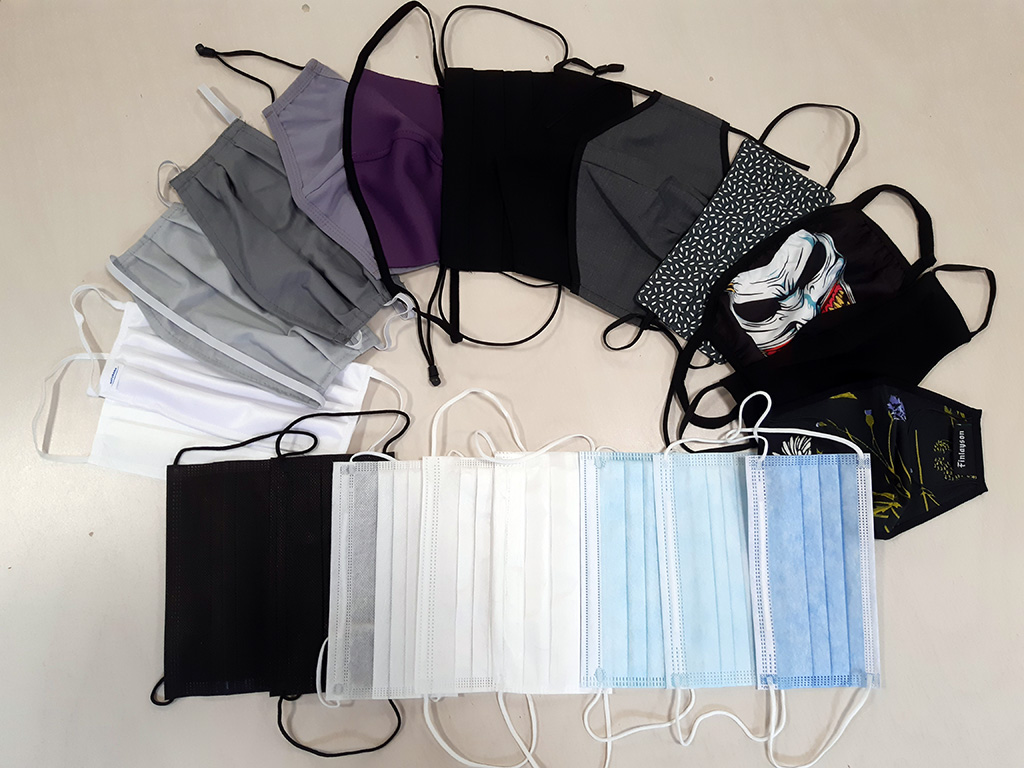Tukes tested the chemicals in civil masks – no concentrations harmful to health were found

The Finnish Safety and Chemicals Agency (Tukes) studied in spring 2021 the chemicals in civil masks, i.e. cloth masks and disposable fibre masks, sold to consumers. No harmful concentrations of hazardous substances were found from the civil masks tested.
Tukes tested a total of 21 different civil masks in spring 2021. The masks chosen for the test were sold in shops or online, or they were otherwise available to consumers. The masks were both from foreign and domestic manufacturers. Tukes decided to test the chemicals in masks because there had been a number of reports from consumers of the civil masks.
“Tukes does not inspect the products in advance, but we test and monitor products available to customers based on their risks by means of spot checks. Consumers had contacted Tukes about unpleasant or strong odours in civil masks, and we wanted to examine the chemicals in them in more detail”, says Elina Vaahtovuo, senior officer at Tukes.
Tukes monitors civil masks and personal protective equipment intended for consumer use on the Finnish market. Manufacturers, importers and sellers are responsibility for product safety, and they should also take into account any chemicals in the masks.
Test results
Finnish Institute of Occupational Health (FIOH) tested the masks upon the request of Tukes. Volatile substances released into the air from the masks were tested. Hundreds of different volatile organic substances were examined. In addition, the concentration of formaldehyde in the masks was measured.
Almost all products, such as textiles and detergents, might release various amounts of substances into the air. Some of these volatile substances could cause respiratory irritation. Textiles might contain formaldehyde from the chemicals used in textile finishing. If the skin contact is repeated and prolonged, formaldehyde could cause allergic contact dermatitis.
The test showed a great variation in total concentrations of these volatile substances between different masks. Higher total concentrations in some masks might explain stronger odours. A product’s odour or the absence of odour does not directly say anything about its impacts on health. Health impacts depend on individual substances’ hazardous properties and exposure levels, i.e. the concentrations of harmful substances in the air.
“People have been concerned of strong odours in some masks, because masks are used for longer periods at a time. Still, the odour alone does not imply that the product would be harmful to health. Harmful health impacts caused by the substances in the masks tested are very unlikely”, says Petteri Talasniemi, senior officer at Tukes.
In high concentrations, some of the substances found in the test might cause temporary irritation to eyes and the airways. However, the concentrations of these substances were very low and they were below the maximum concentration limits set for the air. Concentration limits have been set to secure people’s health. Low concentrations of formaldehyde were found in unwashed cloth masks, in particular. Even though the concentrations were low, this confirms the recommendation to wash cloth masks before their first use.
Consumer – you can ask a product’s manufacturer, importer or seller about the chemicals in the product
Persons who are more sensitive to irritating and sensitising substances might get symptoms even from very low concentrations. If you get symptoms from a certain mask, stop using the product and try some other mask. You can reduce the substances that might be released from the masks by airing them out or by washing them before use.
“If a mask has a strong odour, it can be aired out in clean and dry space before use. Cloth masks should always be washed before use”, advises Elina Vaahtovuo.
The EU does not yet have any explicit requirements for civil masks. Apart from the EU’s chemical legislation, they must meet the general safety requirements of the Consumer Safety Act, which means that they must not pose a danger to the health of anyone. Civil masks are currently being standardised on the EU level.
Consumers have the right to get information on any so called substances of very high concern in civil masks, as well as on possible biocidal treatments, from the product’s manufacturer, importer or seller. Biocidal treatments can be used to destroy viruses and bacteria, for example, in the masks.
Tested products and summary of the results
Test results are specific to product batches.
Summary of the test results (pdf, in Finnish)
Further information for media
Market surveillance: Elina Vaahtovuo, senior officer, tel. +358 29 505 2003
Chemical-related risks: Petteri Talasniemi, senior officer, tel. +358 29 505 2104
email addresses [email protected]
Further information
Respiratory protective equipment – Finnish Safety and Chemicals Agency (Tukes)
Ask about chemicals in a product (in Finnish)


